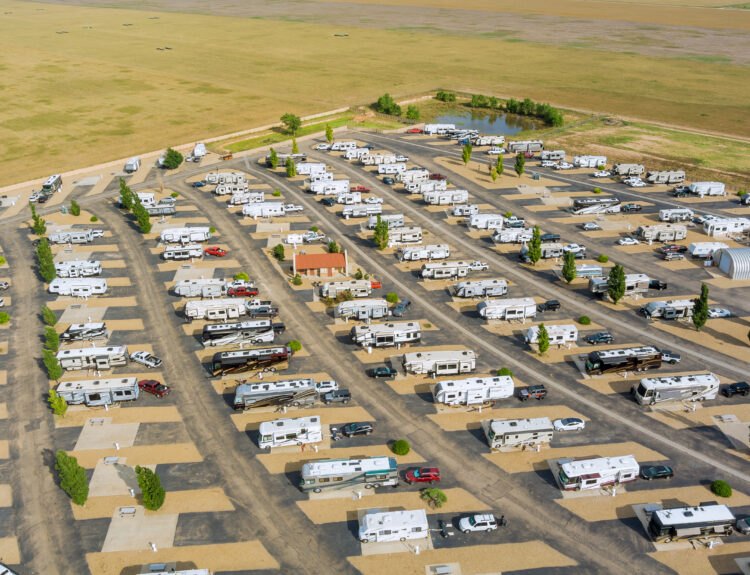Selling a campground is a major financial and emotional decision. Unlike selling a home or commercial property, it requires in-depth financial preparation, strategic marketing, and careful negotiation. Whether you’re retiring, reinvesting, or moving on to a new venture, maximizing your campground’s value and finding the right buyer should be your top priorities.
This article will walk you through the entire process, from assessing the market to finalizing the sale. By following these steps, you’ll ensure a smooth transaction and a profitable deal.
Key Takeaways
- Proper financial preparation and property maintenance can significantly impact the sale price.
- Understanding market trends helps determine the right time to sell.
- Listing on the right platforms and creating a strong marketing strategy attracts qualified buyers.
- Pricing your campground correctly is key to securing a profitable sale.
- Negotiating and closing require careful attention to legal and financial details.

Understanding the Campground Market
Before selling your campground, it’s essential to analyze the market to ensure you list at the right time and attract serious buyers. The demand for campgrounds has risen in recent years, but factors such as interest rates, seasonal trends, and buyer demographics can influence your sale.
Analyzing Market Trends
The campground industry has gained significant investor interest, driven by the increasing popularity of RV travel, glamping, and outdoor tourism. However, market fluctuations can affect how quickly a property sells and at what price. The demand for campgrounds is typically higher in peak camping seasons, but economic conditions such as rising fuel prices and interest rates can impact a buyer’s ability to finance a purchase.
Key trends to monitor:
- RV and camping tourism growth: Increased consumer demand boosts campground value.
- Economic conditions: Interest rates, fuel prices, and inflation can affect buyers’ purchasing power.
- Investor vs. owner-operator interest: Some buyers seek campgrounds as passive investments, while others want a hands-on business.
By tracking market trends, you can determine the best time to list your property and set a competitive price.
Knowing Your Target Buyer
Understanding who might buy your campground helps tailor your marketing approach. Potential buyers fall into different categories.
- Lifestyle buyers are looking for a hands-on business opportunity and will be interested in a campground that is easy to operate and well-maintained.
- Corporate investors prioritize financial performance and look for campgrounds with strong revenue, high occupancy rates, and expansion potential.
Some buyers are existing campground operators looking to acquire more locations, while others are developers looking to repurpose land. Each type of buyer has unique priorities. Lifestyle buyers may want a campground with minimal improvements, while corporate investors may want properties with a high return on investment.
Preparing Your Campground for Sale
A well-prepared campground attracts more buyers and commands a higher sale price. Financial and physical preparation ensures that buyers see the full value of your property.
Financial and Legal Preparation
Buyers will perform due diligence to verify everything about your campground’s finances and legal status before finalizing a deal, so having organized financial records is crucial. Key documents to prepare include:
Profit & Loss Statements (3-5 Years)
Buyers analyze your campground’s profit & loss statements to assess revenue, expenses, and profitability over time. These documents should be accurate, CPA-reviewed, and consistent with your tax returns. Seasonal fluctuations should be explained with monthly or quarterly breakdowns to show business trends.
A common issue is inconsistent records, such as missing revenue or commingled personal expenses. Ensure financials reconcile with bank statements, and prepare explanations for anomalies. Buyers trust clean, transparent books, so proactive organization increases confidence and speeds up due diligence.
Tax Returns
Buyers require at least three years of tax returns to verify reported revenue and expenses. Tax filings should align with profit & loss statements, and discrepancies must be justified. Returns also highlight depreciation, deductions, and business health.
Common red flags include underreported income, unfiled returns, or excessive deductions that misrepresent profits. Work with a CPA to clarify tax records and prepare explanations for any anomalies. Ensuring tax returns are organized and accurate prevents delays and builds buyer trust.
Utility Costs & Payroll Records
Utility and payroll expenses help buyers assess operational costs. Providing electricity, water, propane, and maintenance bills for at least one to two years establishes cost trends. Payroll records should outline wages, seasonal staff expenses, and employee contracts.
Buyers may question fluctuations in costs or unclear labor expenses. Prepare documentation on staffing needs, utility-saving upgrades, and any long-term contracts to reassure buyers. Clarity in these records ensures they understand the true operational costs of running the campground.
Occupancy Rates & Reservation History
Buyers assess occupancy data to gauge seasonality, revenue stability, and growth potential. Providing at least three years of reservation reports gives insight into peak seasons, long-term guests, and average stay durations.
Common issues include gaps in booking records or missing trends analysis. If you use reservation software, generate monthly reports showing trends. Highlight strong occupancy periods and demonstrate opportunities for growth through dynamic pricing or marketing strategies.
Business Licenses & Permits
Campgrounds must comply with local zoning, health, and business regulations. Ensure business licenses, health permits, and zoning approvals are current and available. Buyers need assurance that operations can continue without legal barriers.
Issues like expired permits, zoning restrictions, or missing occupancy approvals can jeopardize sales. Confirm zoning compliance and resolve any outstanding violations before listing. Transparency with legal documentation avoids delays and strengthens buyer confidence.
Failing to provide accurate and complete records can delay or even jeopardize a sale. Consider working with an accountant or broker to ensure all finances are in order.
Property Maintenance and Upgrades
The physical condition of your campground greatly impacts its marketability. Buyers will conduct inspections, so addressing maintenance issues before listing is essential.
Key areas to focus on:
- Infrastructure: Ensure roads, water systems, and electrical hookups are in good condition.
- Amenities: Upgrading facilities like restrooms, cabins, and laundry areas increases appeal.
- Curb Appeal: Well-maintained landscaping and clear signage create a strong first impression.
- Safety & Compliance: Ensure fire pits, playgrounds, and public areas meet regulatory standards.
A property in excellent condition justifies a higher asking price and speeds up negotiations.
Investing in maintenance and upgrades not only enhances the campground’s appeal but also strengthens its valuation. A well-kept property with modern amenities and compliant infrastructure can justify a higher asking price. With the campground in top shape, the next step is determining its true market value to attract serious buyers and maximize your return.

Valuing Your Campground
Pricing your campground correctly is one of the most critical steps in the selling process. Overpricing can deter buyers, while underpricing leaves money on the table. A competitive and profitable price should reflect market trends, income, and industry-standard valuation methods.
Methods for Determining Value
There are three primary approaches to campground valuation. The income approach bases the value on net operating income (NOI) and capitalization rates. The comparable sales approach examines recent sales of similar campgrounds in your region. The asset-based approach values the land, buildings, and infrastructure separately. Many buyers rely on income-based valuation, meaning that accurate revenue records are crucial for justifying your price.
Understanding Revenue Multipliers and Cap Rates
Most investors look at cap rates (capitalization rates) to determine a campground’s profitability. The cap rate is calculated by dividing the property’s net operating income by its sale price. Higher cap rates indicate higher risk, while lower cap rates suggest stable, high-demand properties. Understanding how buyers evaluate ROI (Return on Investment) will help you justify your asking price and attract serious investors.
Marketing Your Campground for Sale
An effective marketing strategy ensures your listing reaches the right buyers and stands out in a competitive market. High-quality photos, detailed property descriptions, and well-placed listings increase interest and lead to a faster sale.
Where to List Your Campground for Sale
Listing your campground on the right platforms is crucial. The more exposure your listing gets, the higher the chances of attracting serious buyers who are willing to meet your price expectations. Below are the best places to list your campground, including commercial real estate platforms, industry-specific brokers, and alternative marketing strategies.
- Commercial real estate websites like LoopNet, Crexi, and BizBuySell attract investors looking for campground properties. These platforms allow you to provide financial details, property photos, and maps to showcase your campground’s potential.
- Campground-specific brokers, such as The Campground Marketplace, Parks and Places, and KOA Campground Sales, specialize in selling campgrounds and RV parks. These brokers have a network of buyers looking specifically for campgrounds, which can help streamline the process.
- Industry-specific marketplaces like RV Park Store, Campground Connection, and Glamping Hub for Sale are also excellent places to list your campground. These platforms attract buyers who are already interested in the outdoor hospitality industry.
If your campground is located in a popular tourist destination, working with a local real estate agent who specializes in commercial properties may also be a viable option. In some cases, auctioning a campground through a commercial real estate auction service like Williams & Williams can result in a faster sale.
Negotiating the Sale and Closing the Deal
Receiving an offer is just the beginning. Successfully closing the deal requires careful negotiation, financing considerations, and legal oversight.
Evaluating Offers and Buyer Qualifications
Not all offers are equal, and choosing the right buyer is about more than just the highest price. A buyer’s financial standing, contingencies, and closing timeline all affect how smoothly the sale progresses.
1. Financial Standing: Cash vs. Financing
Cash buyers typically offer faster and more secure transactions since they don’t rely on lender approvals. Financing buyers, on the other hand, must go through loan underwriting, property appraisals, and lender-mandated inspections, which can delay or jeopardize the sale. If considering a financed buyer, request a pre-approval letter and confirm their down payment to gauge their financial readiness.
2. Earnest Money Deposits and Contingencies
A strong buyer should provide 5%–10% of the sale price in earnest money to demonstrate commitment. Low deposits may signal hesitation or financial instability. Contingencies—such as financing approval, property inspections, and environmental studies—protect buyers but can also introduce risks. Too many contingencies increase the chance of the deal falling through. Prioritizing offers with fewer, essential contingencies ensures a more reliable sale.
3. Closing Timeline and Flexibility
Closing can take 30 to 120 days, with cash buyers closing in as little as two to four weeks. If you need a quick sale, avoid buyers with long financing approval timelines. Conversely, if you need time for transition planning, a flexible buyer may be preferable. Some buyers may request early access agreements to begin operations before closing, which can be beneficial if structured properly.
The best offer balances price, financial security, and minimal contingencies. A financially prepared buyer with a reasonable timeline and strong deposit ensures a smoother, lower-risk transaction. Prioritizing these factors over the highest bid can help prevent delays and failed deals.
Navigating the Legal and Financial Closing Process
The closing process finalizes the sale and transfers ownership to the buyer. It begins with a Letter of Intent (LOI) outlining key terms, followed by a due diligence period where the buyer reviews financials, inspects the property, and verifies compliance. If financing is involved, the buyer secures loan approval and places an escrow deposit as a commitment to the purchase.
Once both parties finalize the Purchase and Sale Agreement (PSA), the buyer conducts a final walkthrough before closing. On closing day, legal documents are signed, and funds are transferred. Some deals include a transition period where the seller assists with operations. Proper legal and financial guidance ensures a smooth and secure transaction.

Planning for a Successful Campground Sale with Parikh Financial
Selling a campground is a complex process that requires careful planning, strong financial records, and strategic decision-making. From understanding market trends to preparing your property and negotiating with buyers, each step impacts the outcome of your sale. Ensuring your financials are in order and your campground is positioned as a profitable investment will make the transition smoother and more rewarding.
Parikh Financial specializes in helping campground owners navigate the financial aspects of selling a business. Whether you need guidance on valuation, tax strategies, or structuring a deal that maximizes your return, having expert financial support can make a significant difference. A well-prepared financial plan not only streamlines the selling process but also ensures you receive the best possible outcome for your investment
Frequently asked questions
1. How long does it typically take to sell a campground?
Selling a campground usually takes six months to a year, though the timeline varies based on pricing, location, and market demand. Properties in high-traffic tourist areas with strong financials tend to sell faster, while those in remote locations or with operational challenges may take longer.
Properly preparing financial records, maintaining the property, and setting a competitive price can speed up the process. Working with a campground broker can also help connect you with serious buyers and reduce the time on the market.
2. What are the tax implications of selling a campground?
Selling a campground triggers capital gains taxes on profits, typically 15%–20% for long-term ownership. Additionally, any depreciation claimed over the years is subject to depreciation recapture, taxed at up to 25%.
To minimize tax liability, many sellers use a 1031 exchange to reinvest proceeds into another property and defer taxes. Given the complexities of campground sales, consulting a tax professional is essential to optimize your tax strategy and avoid unexpected liabilities.
3. Should I sell my campground as a business or as real estate only?
Selling as a business usually increases the sale price since buyers are acquiring a turnkey operation with an existing revenue stream, customer base, and operational infrastructure. If the campground has strong financials and a solid reputation, this option is ideal.
Selling as real estate only appeals to buyers looking to repurpose the land or develop a new business but often results in a lower sale price. Your decision should align with your financial goals and the type of buyers you want to attract. Consulting a broker can help determine which approach maximizes your property’s value.
4. How can I make my campground more attractive to potential buyers?
To attract buyers, focus on financial transparency, property condition, and operational efficiency. Ensure financial records are organized and verifiable with tax returns and profit/loss statements readily available. Upgrade facilities, fix maintenance issues, and improve landscaping to enhance curb appeal.
Implementing modern reservation systems and streamlining operations makes the transition easier for buyers. A well-maintained, profitable, and easy-to-manage campground will generate more interest and justify a higher asking price.
5. Is it necessary to hire a broker to sell my campground?
While not required, hiring a campground broker can simplify the process and maximize your sale price. Brokers provide market insights, pricing strategies, and access to qualified buyers, reducing the time it takes to sell.
They also handle negotiations, legal paperwork, and marketing, making the process smoother. However, brokers charge a commission, typically 5%–10% of the sale price. If you’re experienced in real estate transactions, you may sell independently, but for most owners, a broker can save time and prevent costly mistakes.






